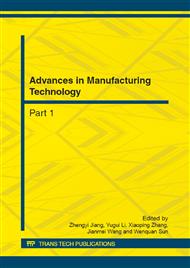[1]
Li Hao-Lin. Production control based on kanban-net and lean production. Industrial engineering journal, 2008, 11(6): 81-84
Google Scholar
[2]
R. Graves, J.M. Konopka and R.J. Milne, Literature review of material flow control mechanisms, Production Planning and Control, 1995, 6(5): 395-403
DOI: 10.1080/09537289508930296
Google Scholar
[3]
Zhang Yinfeng, Huang Guoquan, Jiang Pingyu. Research on intelligent kanban management system for wireless manufacturing workshop based on RFID. Manufacturing automation, 2007, 29(4): 16-18, 43
Google Scholar
[4]
Cheng Gong, Ge Shi-lun, Wu Li-ren. Applied research of transmit kanban in the workshop of shipyard. Ship engineering, 2007, 29(4): 90-94
Google Scholar
[5]
Li Ming, Huang Hongzhong, Wang Zhimin, Huang Guodong. Improvement of kanban system under JIT production model. Coal mine machinery, 2008, 29(1): 134-137
Google Scholar
[6]
AN Jin. Research into the just-in-time centralized production providing and delivering system in automobile enterprise group. Operations research and management science, 2007, 16(1): 144-149
Google Scholar
[7]
Thun, Joern-Henrik, Drueke, Martin, Gruebner, Andre. Empowering Kanban through TPS-principles - an empirical analysis of the Toyota Production System. International journal of production research, 2010, 48(23): 7089-7106
DOI: 10.1080/00207540903436695
Google Scholar
[8]
V. Tardif and L. Maaseidvaag, An adaptive approach to controlling kanban systems, European Journal of Operational Research, 2001, 132(2): 411-424
DOI: 10.1016/s0377-2217(00)00119-3
Google Scholar
[9]
B. Vernyi and T. Vinas. Easing into e-kanban. Industry Week, 2005, 254 (12) : 32
Google Scholar
[10]
R.P. Mohanty, S. Kumar and M.K. Tiwari. Expert enhanced coloured fuzzy petri net models of traditional, flexible and reconfigurable kanban systems, Production Planning and Control, 2003, 14 (5): 459–477
DOI: 10.1080/0953728031000154273
Google Scholar


